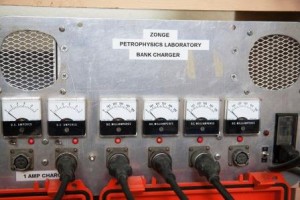Natural remanent magnetization determinations
(Instrument is out of service, inquire before requesting remanent magnetization measurements)
 Natural remanent magnetizations are determined utilizing a 0.5 Hz spinner magnetometer with a fluxgate probe sensor. No AC demagnetization of the natural samples is employed. The samples are prepared by cross-coring a length of 1.0 inch diameter core at a diameter of 1.0 inches, thus forming a bicylindrical specimen.
Natural remanent magnetizations are determined utilizing a 0.5 Hz spinner magnetometer with a fluxgate probe sensor. No AC demagnetization of the natural samples is employed. The samples are prepared by cross-coring a length of 1.0 inch diameter core at a diameter of 1.0 inches, thus forming a bicylindrical specimen.
Samples are spun in three mutually orthogonal directions, resulting in a sensitivity limit of better than 10 micro emu/cc (1.0 gammas). This level of remanence contributes to the total intensity of magnetization at approximately the same level as a magnetic susceptibility of 20 micro cgs units.
Requirements
Samples must be carefully handled magnetically while preserving their original field orientation. They may require demagnetization experiments to reliably determine orientation and magnitude of the NRM vector. Magnetic susceptibility measurements are also made and the Koenigsberger ratio for the specimen is determined.
Results
Magnetization magnitude results are reported in gammas. The direction of the natural remanent magnetization vector is referenced by declination to north (usually magnetic) and by inclination to the horizontal. The inclination angles are positive below and negative above the horizontal. The direction of the total intensity of magnetization vector (I) is a vector summation of the natural remanent magnetization vector (J) and the inducing vector (kF) due to the normal earth’s field at the sample site. The relationship is as follows:
_ _ _
I = J + kF
I = The total intensity of magnetization
J = The magnetization vector
F = The normal field of the earth (default= 50,000 gammas)
Natural remanent magnetization in units of emu per cc (gauss) or SI units is given by:
J = 0.00001 J and J = J
emu/cc gamma nanoTesla gamma
The Koenigsberger ratio, the ratio of the natural remanent magnetization to the induced magnetization at the sample site, is given by:
J
Q = --- (dimensionless)
kF
The Koenigsberger ratio (Q) is a direct measure of the ratio of remanent magnetization to induced magnetization. For ratios greater than 1.0, the remanent magnetization vector is the predominant contribution to the total intensity of magnetization.
The arrow on each double-cored sample points down-dip in the strike direction of the core. The scribed line is on the top side of the core.
The magnetic dipole moment (magnetization or magnetic polarization) is:
2
Pm = magnetic dipole moment in amp-meters
1. For V = volume in cubic meters,
and J = remanent magnetization in amp/meters:
then Pm = V x J
2. For V = volume in cubic centimeters,
and J = remanent magnetization in gammas,
-8
then Pm = 1x10 x V x J
3. For V = cross-cored sample volume = 10.92 cubic centimeters,
and J = remanent magnetization in gammas,
-7
then Pm = 1.092x10 x J

